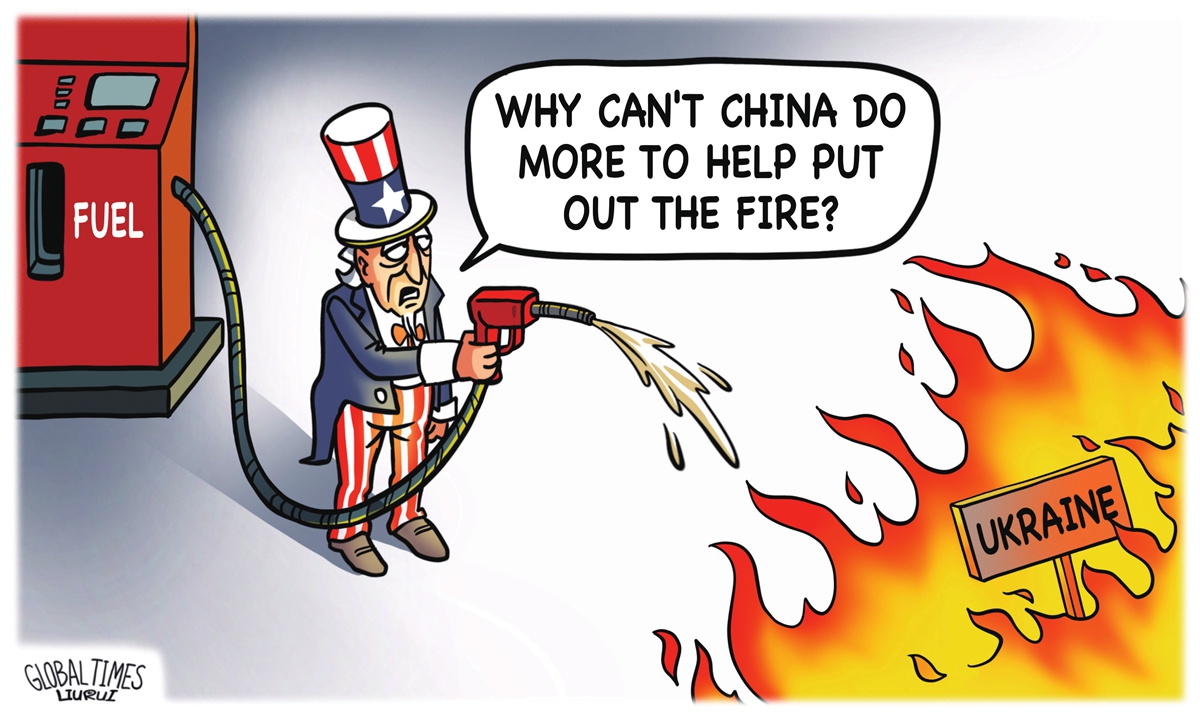
Illustration: Liu Rui/GT
The close relationship between China and Russia has been a source of uneasiness for the US, especially against the backdrop of the ongoing Ukraine crisis. The solution? According to a Wall Street Journal report on Sunday, US officials said one step of prying China away from its relations with Russia is "making Beijing feel pain" over Russia's action in Ukraine.This is not the first time that the "make China feel the pain" rhetoric has been circulated. An article in Foreign Policy magazine before Russia's action clamored, "If Russia invades Ukraine, sanction China."
Washington has no intention to hide its hope of seeing a wedge between Beijing and Moscow. In the eyes of Washington, a weakened China-Russia relationship will serve as an obstacle for Russian President Vladimir Putin to solve the Ukraine crisis. It could also place the US in an advantageous position in two of its battlefields - one in Europe against its rival Russia and the other in the Asia-Pacific region against China. It could also send a signal to its allies in Europe and the Asia-Pacific region to re-establish leadership and enhance confidence toward the US.
The US is making geopolitical calculations. This exactly reveals its anxiety in the face of a China-Russia entente. The underlying reason is waning leadership and diplomatic flexibility in regional crises.
Zuo Xiying, a research fellow at the National Academy of Development and Strategy, Renmin University of China, told the Global Times that the pain that the US wants to make China feel means limiting China's policy choices, increased political cost and reputation loss for China, and a change of stance on the Ukraine issue.
The US is trying to pull China into the Ukraine crisis so that it can hold China in check and dig into its interests while reaping the dividends of the conflict. According to the Wall Street Journal article, escalating sanctions against Russia are among the sharpest warning flares to Beijing.
Li Haidong, a professor from the Institute of International Relations of China Foreign Affairs University, told the Global Times that the US does have levers on financial sanctions. The US decision to remove some Russian banks from the SWIFT global payment system is a harsh tool against Russia. But it needs to be recognized that while driving Russia out of the financial transaction system would not be a big loss for the US in light of the relatively weak economic link with Russia, its European allies that depend on oil and gas imports from Russia would be greatly affected.
And given the size and integration of the economies of China and the US, a potential sanction against China is bound to impact the stability of global trade and financial systems, harming interests of both China and the US. In other words, the US should be mindful of repercussions.
The interests of Ukraine and US allies and those of US rivals are expendable to the US. The situation in Ukraine today is a geopolitical tragedy and a bitter fruit once sown by the US out of strategic selfishness and short-sightedness. Now, it wants to kidnap China's interests, squeeze its diplomatic space, create the impression that "the US is trying to put out the fire," and put the blame on China and Russia. But in fact, Washington is the one who set the fire.
As China becomes a major power, it is bound to play an important role in international events. China's position is by no means driven by Washington, but out of its own interests and the interests of the region. Consistent with its stance on Ukraine, China determines its position concerning the issue based on the merits of the matter itself and China supports Russia in solving the issue through negotiations with Ukraine.
China maintains that the sovereignty and territorial integrity of all countries should be respected and protected and the purposes and principles of the UN Charter should be earnestly observed.
The more the US drives a wedge between China and Russia, the more it shows the importance of China's stance. US officials' clamor via the media will not achieve the desired results against China's diplomacy.
The author is a reporter with the Global Times. opinion@globaltimes.com.cn



